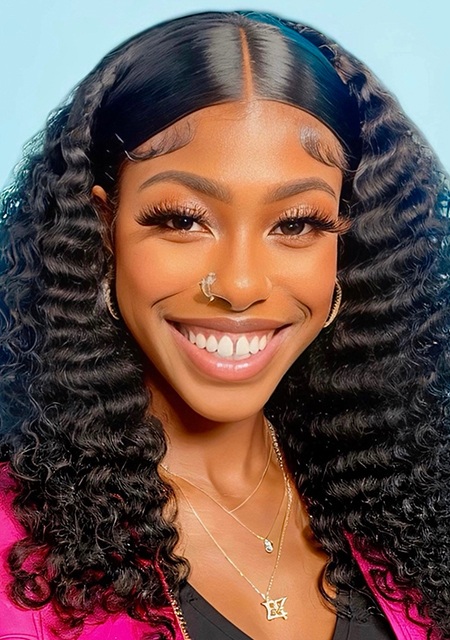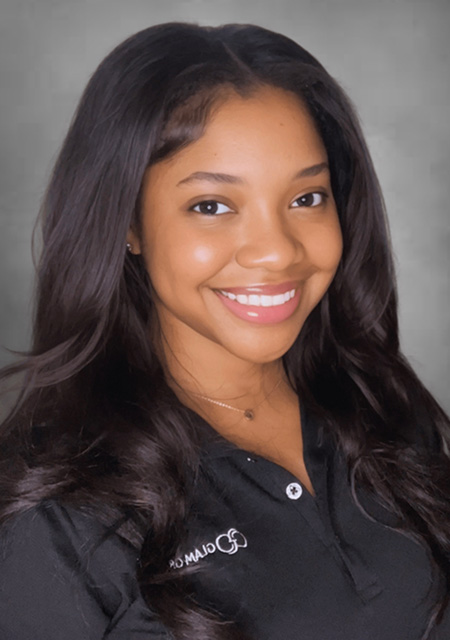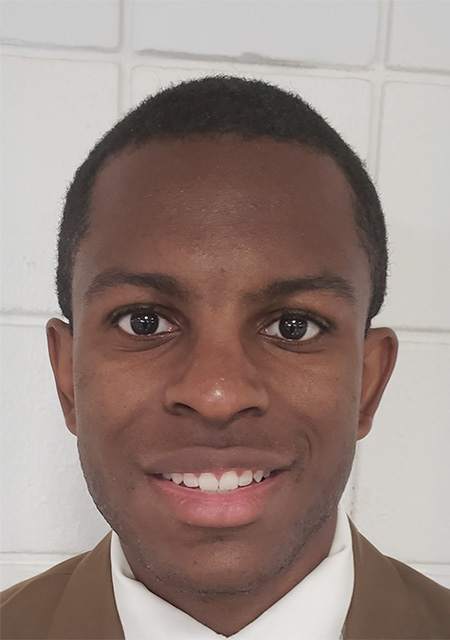Journalism, B.S.
About This Program
As a journalism major, you will take classes that allow you to learn from industry experts and gain hands-on experience through participation in award-winning publications, on-air television broadcasts, and radio programs. Our scholars learn high-demand skills such as research, reporting, ethical decision-making, production, writing, and editing, all of which enable journalists to effectively share information in different formats and styles.
Upon graduation, you will leave the School of Journalism & Graphic Communication with
the tools needed for career success and to empower the public with information.
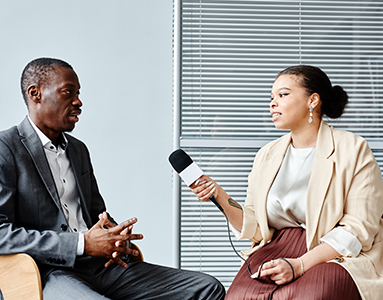
What is journalism?
Journalists produce news stories, features, in-depth narratives, reviews, live reports,
commentary, or investigations for print, broadcast, digital or social media platforms
such as newspapers, magazines, radio, podcasts, television, or websites.
Journalists present accurate and timely information so community members can form
opinions and make decisions about their lives and society.
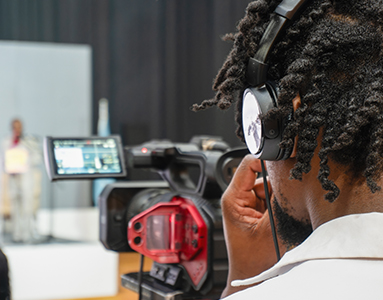
Journalism Careers
Journalists work in diverse settings, ranging from traditional newsrooms to digital
media outlets, broadcasting stations, studios, and freelance opportunities. The field
of journalism offers a wide range of career paths for those with journalistic and
storytelling skills. These career paths include:
- Reporter
- Editor
- Producer
- News Director
- Managing Editor
- Anchor
- Correspondent
- Multimedia Journalist
- Video Content Creator
- Visual Journalist
- Editor-in-Chief
- Copy Editor
- Social Media Editor
- Audience Engagement Editor
- Magazine Writer
- Commentator
- News Analyst
- Columnist
- Data Analyst
- Page Designer
- Graphic Designer
- Web Designer

Journalism Salary Expectations
- According to the U.S. Bureau of Labor, in 2023, the top average income for a national journalist, reporter or news analyst was:An estimated mean hourly wage of $48.76.
- An estimated mean annual salary of $101,430
The states/districts with the highest employment level of journalists, reporters and news analysts are:
- New York
- California
- Florida
- Texas
- District of Columbia

Journalism Frequently Asked Questions (F.A.Qs)
Q: What is the difference between journalism and blogging?
A: Journalism is a professional practice involving the gathering and sharing of news
and information by trained journalists, adhering to ethical standards. Blogging is
more personal and subjective, often reflecting the opinions and experiences of the
individual writer.
Q: What are some of the essential skills journalists should develop for success?
A: To achieve success, journalists should hone skills such as reporting, research, writing,
interviewing, editing, listening, communication, time management, interpersonal relations,
critical thinking, collaboration, accuracy, and attention to detail.
Effective communication, interpersonal skills and a reliable reputation contribute to gaining trust, which is essential for successful journalism.
Q: What industries have the highest employment levels of journalists, reporters, and
news analysts?
A: Newspaper, periodical, book, and directory publishers; media streaming distribution
services; social networks, media networks, and content providers; radio and television
broadcasting stations; motion picture and video industries; colleges, universities,
and professional schools.
Q: What are the top-paying industries for journalists, reporters, and news analysts?
A: Media streaming distribution services, social networks, media networks, and content
providers; management of companies and enterprises; telecommunications; civic and
social organizations; other professional, scientific, and technical services.
Q: After graduation, can I start working in a large market such as Atlanta?
A: Not likely. Large markets typically require several years of experience and proven
ability and achievement. Beginners are better off honing their skills in small markets
that are more forgiving when you make mistakes.
Q: How can I get started working as an entertainment or sports journalist?
A: Focus on being a good journalist with foundational skills, period. The same journalistic
precepts apply in any beat, whether you are covering city hall or the Los Angeles
Lakers.
Q: Should I start out in TV news as a video editor and work my way up to reporting?
A: Start out with what you want to do! If you start as a video editor, it is extremely
hard to get news managers to see you as anything other than that. However, it is useful
to develop skills that give you more insight on how things work in front and behind
the scenes, which makes you more marketable and well-rounded.
Are you thinking about pursuing a career in Broadcast Journalism? Our program prepares students to become highly-trained Broadcast Journalists.
If you are thinking of majoring in Broadcast Journalism, consider what some of our own Rattlers had to say about FAMU's Broadcast Journalism program, what inspired them, and why they chose Broadcast Journalism as a career.
I absolutely love the Broadcast Journalism program at FAMU! It's a dynamic blend of hands-on experience and insightful learning. The professors are industry professionals who bring real-world knowledge to the classroom. We have access to the latest equipment and studios that prepare us for the fast-paced world of multimedia. What truly sets FAMU apart is the sense of community within the SJGC program. We're like a tight-knit family, supporting and pushing each other to excel. Plus, FAMU's legacy in producing top-notch journalists is inspiring. I'm thrilled to be part of this program, learning, growing, and preparing for an exciting career in multimedia.
As a transfer student at FAMU, my love for the university and its journalism program is unequivocal. FAMU's rich heritage of academic excellence resonates deeply with me. The journalism program's reputation for nurturing talented voices and its commitment to promoting ethical and impactful storytelling aligns perfectly with my aspirations. The vibrant campus atmosphere and the opportunity to learn from experienced faculty and peers who share my passion for journalism make FAMU a welcoming home for my academic and professional growth. This unique blend of tradition and innovation sets FAMU apart and fuels my profound affection for the institution and its journalism program.
I love being able to be an ambassador for athletics and writing documents and articles. I am a young man who has game recap articles on tcceagles.com of Men's Basketball Games. I love the opportunity to be featured on The Flava Station as being able to discuss different topics around our campus and the world. I also love the internship opportunities that the School of Journalism has to offer.
Program Faculty
| Name | Phone | |
|---|---|---|
| Mr. William Jiles, Division Director | william.jiles@famu.edu | (850) 412-5393 |
| Dr. Felicia McGhee, Professor | ||
| Mr. Kenneth Jones, Professor | (850) 561-2779 | |
| Dr. Jeffrey Wilkinson, Professor | (850) 561-2796 | |
| Dr. Leah Hunter, Associate Professor | (850) 599-3840 | |
| Mr. Clarence Fowler, Visiting Professor | N/A | |
| Ms. Chandra LaNier, Adjunct instructor | (850) 412-6587 | |
| Ms. Glyndell Presley, Adjunct Instructor | N/A | |
| Ms. Ranata Hughes, Internship Coordinator and Adjunct Professor | N/A | |
| (850) 561-2779 | ||
| (850) 412-5385 | ||
| (850) 599-3379 |






